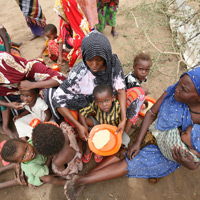
Ken Menkhaus is a professor of political science at Davidson College and a specialist on Somalia and the Horn of Africa. He worked on famine response policy in Somalia in 1991 and served as a political advisor in the U.N. Operation in Somalia in 1993-94. He is author of over 50 monographs, chapters, and articles on Somalia and the Horn of Africa, and has testified five times before congressional committees on aspects of the Somali crisis.
Summary: The scale of the famine in Somalia demands a reordering of priorities in the country. The international community must temporarily redirect the pressure it is placing on Somalia’s Transitional Federal Government, or TFG, insisting that it focus first and foremost on ensuring unimpeded access to famine victims in its areas of control. The international community must use humanitarian access in Mogadishu, not progress in advancing the political transition, as the key yardstick to judge the TFG’s performance. Essential tasks in the political transition can still be advanced during the humanitarian crisis but should not be accorded top priority while a famine is raging.
First things first. The most fundamental duty of any government is to provide its citizens with basic protection from physical threat and extreme deprivation, whether from war, criminal violence, or natural disaster. Everything else should come second.
Given the massive scale of the humanitarian crisis in Somalia, where 750,000 people are at immediate risk of famine and a total of 4 million—half the total population—needs emergency assistance, one would expect the Transitional Federal Government, or TFG, and other local Somali authorities to temporarily set aside other agendas and devote most of their energies to ensuring the effective flow of relief aid to famine victims. And one would expect the United Nations and international donors to insist on this ordering of priorities. Certainly Somali citizens have every right to demand this.
Instead, Somalia has been the scene of a stunning case of misplaced priorities this year. Rather than pressing the TFG to devote its full attention to gaining control over its predatory security forces and corrupt politicians so that food aid can reach the hundreds of thousands of displaced famine victims in Mogadishu, Western donor countries, the United Nations, and regional governments have instead pressured TFG leaders to focus on politics— namely power-sharing accords and implementation of key transitional tasks.
As a result, the past five months were devoted to a raft of political initiatives, including:
- The “Kampala Accord,” which brokered a new power-sharing deal between rivals President Sheikh Sharif and Speaker of Parliament Sharif Hassan Sheikh Aden
- Agreement on a new “roadmap” to accelerate the transition
- The selection of yet another new prime minister and formation of yet another cabinet
- Establishment of a new committee on the constitution
- Regional and global summits on the mandate of the African Union peacekeepers and other political matters
- Meetings of the international contact group with the TFG
- Many foreign junkets by the TFG’s top leaders
Under normal circumstances, this preoccupation with advancing Somalia’s political transition would be entirely appropriate. The TFG—now in its seventh year of what was supposed to be a five-year transitional process—has achieved almost none of the critical transitional tasks required of it. Nor has it demonstrated much interest in building up the central government’s capacity to govern.
This “transition in perpetuity” in Somalia has become its own economy, allowing political elites and their supporters to enrich themselves with the trappings of sovereignty without having to trouble themselves with the vexing task of actually governing and without having to subject themselves to a popular referendum on their performance— elections. Deep international frustration with the recalcitrance of the TFG leadership has been a major driver of the insistence by donors and the United Nations for rapid progress to end the transition in Somalia.
But in the context of a massive famine, preoccupation with advancing the transition is misplaced. To Somalis and many outside observers, it comes across as a case of rearranging deck chairs on the Titanic. It diverts energies from the immediate crisis at hand. And it sends the wrong message to TFG leaders: that the yardstick used to assess the TFG’s legitimacy and viability is progress in drafting constitutions and establishing committees rather than protecting the lives of its own citizens. Make no mistake—to date, TFG leaders have come under far greater pressure from the international community to advance the political transition than to facilitate the flow of emergency relief in areas of the capital Mogadishu that are under their control.
The good news is that this is beginning to change. Almost every statement from U.N. officials and other international diplomats now includes an obligatory call for the TFG to ensure that food aid gets to famine victims in Mogadishu. U.S. diplomats insist that Mogadishu should be a model for effective relief operations and that the current situation is unacceptable.
But in routine diplomatic contact between the TFG and the outside world, the humanitarian crisis is still taking a back seat to the political transition. There is a big difference between appending a reference to humanitarian access onto a statement or a resolution and prioritizing humanitarian access with forceful language both in public and behind the scenes.

